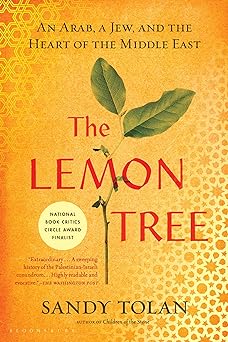More on this book
Community
Kindle Notes & Highlights
by
Sandy Tolan
Read between
April 5 - April 25, 2022
In essence, this critique holds, Palestine would have been not a state, but an "entity" broken into several parts, with limited sovereignty and little control of its own resources. Even for those Palestinians willing to achieve a historic compromise, this was not an acceptable outcome to decades of struggle and sacrifice.
Malley wrote in the New York Times, "The measure of Israel's concessions ought not be how far it has moved from its own starting point; it must be how far it has moved toward a fair solution."
what the Israelis call the Temple Mount, with its Western (or Wailing) Wall, is the Haram al-Sharif ("Noble Sanctuary"), a large complex of Muslim holy places that include the Dome of the Rock and the Al-Aqsa Mosque.
The deaths of the Palestinian citizens of Israel also provoked an outcry within Israeli society, and a national investigative committee headed by an Israeli supreme court justice put the police behavior under high-profile scrutiny.
They were amazed at the outpouring of emotion from Arab citizens who began talking openly about their own family stories from 1948. "Suddenly, Arabs opened up with statements of pain," Yehezkel recalled. "Liberal, well-meaning Israelis who thought they were building cultural bridges and alliances were forced to confront the fact that there were endemic problems and injustices in Israeli society that required much more than cross-cultural encounter and coexistence activity.
For many Palestinians like Bashir, such claims, grounded in a 1948 United Nations resolution, remained paramount; for others they were less important than ending the occupation, now in its thirty-eighth year. Since the outbreak of the second intifada, more than 550 Palestinians under the age of eighteen had been killed.
"With horrific statistics like this, the question of who is a terrorist should have long since become very burdensome for every Israeli," an Israeli columnist wrote. "Who would have believed that Israeli soldiers would kill hundreds of children and that the majority of Israelis would remain silent?"
Other Palestinians endured lengthy waits in long lines at muddy, potholed crossings or on foot at the checkpoint turnstiles. In one incident, a young Palestinian man on his way to a violin lesson was told by Israeli soldiers to take out his instrument and "play something sad" before he was allowed to pass. For many Israelis, the incident evoked memories of Jewish violinists forced to play for Nazi officers at concentration camps, and it created a national outrage. Many of the commentators believed the checkpoints were essential for protecting Israel from suicide bombers, but they believed the
...more
"Someone has to convince America of our right of return. Everybody should go back to his house. What about us these last fifty-six years? Whoever cares about us? Everybody cares only about them. They should go back where they came from. Or they could go to America. There's plenty of space there."
Ghiath would not back down. The problem of the day, he believed, was not return, it was the occupation.
This was Israel's "security barrier" separating the West Bank from Israel and, in some cases, the West Bank from itself. Construction for the barrier had begun in 2002 and would include six thousand workers digging trenches, stringing razor wire, erecting guard posts, laying concrete, and installing tens of thousands of electronic sensors. Part wall, part electrified fence, the construction project would cost $1.3 billion, or more than $3 million per mile. "The sole purpose of the fence," Israel declared, "is to provide security" in response to "the horrific wave of terrorism emanating from
...more
"For Palestinians it didn't change the daily life. It went from bad to worse. I didn't go back to al-Ramla. We don't have our independent state, and we don't have our freedom. We are still refugees moving from one place to another place to another place to another place,
By not accepting the state of Israel or by not accepting the state of Palestine, I think none of us has a real life here.
For Dalia, the key to coexistence lay in what she called "the three A's": acknowledgment of what had happened to the Palestinians in 1948, apology for it, and amends.
"Our right of return is a natural human right," Bashir said. "The Israelis created this problem, and they can't place more burdens on us to solve it."
Bashir’s visitors, and Dalia’s, have one thing in common. From Christian pilgrims bound for the Holy Land, to young American Jews sorting out their mixed feelings of loyalty and justice, to members of Israel/Palestine dialogue groups seeking new answers to a century-old tragedy,
Given the bleak reality in the Holy Land, how much change can any one book generate? A just peace seems as remote today as at any time since the Nakba, or, if you prefer, the War of Independence, in 1948. Yes, being moved to understand history in a new way is powerful indeed. Yet it is something else to understand and influence the structures of power which hold the status quo in place; indeed, which squeeze the pincers ever tighter.
Since Dalia and Bashir last saw each other, in 2005, multiple wars have devastated Gaza, killing more than 3,200 Palestinian civilians, including more than one thousand children, mostly killed by Israeli air strikes. During that same time, twenty-nine Israeli civilians died from Hamas or other militant rocket attacks launched from Gaza. None of those were children. Yet, despite the dramatic disparity in casualties, throughout Israel, and in the media, Palestinians are often portrayed as the aggressors, and Israelis, the victims. And so, as Israelis become more fearful, and their leaders seize
...more


